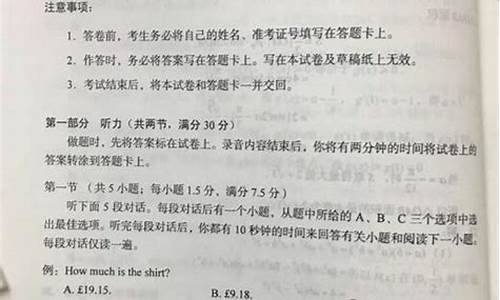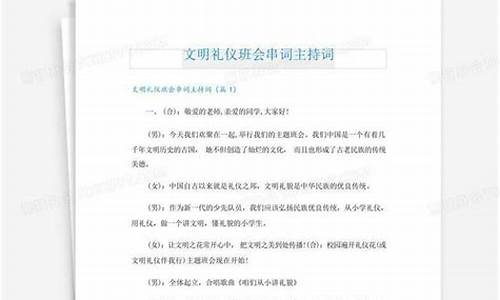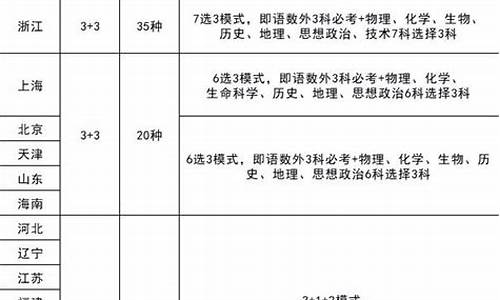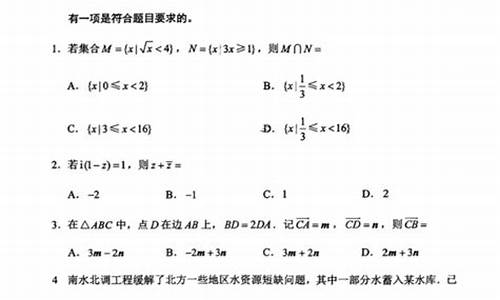您现在的位置是: 首页 > 教育新闻 教育新闻
2017南通英语中考,2017高考南通英语
tamoadmin 2024-06-04 人已围观
简介1.高考英语阅读理解训练2.高考英语题型:怎么答完形填空题760分。根据查询中考网官网显示,2017南通中考语文、数学、英语总分均为150分,物理与化学总分为150分,思想品德与历史总分为100分,体育与健康总分为60分,学业科目考试总分值为760分。高考英语阅读理解训练Nantong City is located at the estuary of the Yangtze River in t
1.高考英语阅读理解训练
2.高考英语题型:怎么答完形填空题

760分。根据查询中考网官网显示,2017南通中考语文、数学、英语总分均为150分,物理与化学总分为150分,思想品德与历史总分为100分,体育与健康总分为60分,学业科目考试总分值为760分。
高考英语阅读理解训练
Nantong City is located at the estuary of the Yangtze River in the east of Jiangsu province. Bordering on the river and facing the Pacific Ocean sea , the city appears like a peninsular and stands opposite Shanghai across the river, enjoying a golden coast and waterway as well as such well-known titles as “ Pearl of the River and Sea ” and “ the First Window on the Yangtze River ” .
Nantong also boasts a long history with its Haian Qingdun Area inhabited with primitive clans more than 5000 years ago.
As one of China's first 14 coastal cities opening to the outside world, Nantong now administers 4 county-level cities (Rugao, Tongzhou, Haimen, and Qidong), 2 counties (Haian and Rudong), 2 districts (Chongchuan and Gangzha), as well as the state -level Nantong Economic and Technological Development Zone. The city covers a total land area of 8,001 sqm km2 and bordering sea area of about 10,000 sqm km2 with its population totaling to 7.8 million. The urban area occupies 381.26 sqm km2 with a population of 759.8 thousand.
Located in the warm and wet monsoon subtropics, Nantong enjoys sufficient sun shine , profuse rainfall, and warm climate with distinct seasons. Flat in terrain and covered with a dense water system, the city has more than 400 km of riverbank and coastline and extensive shallows. As one of China's national industrial cradles in modern times, Nantong has a relatively strong comprehensive economic strength and ranks among the top 50 cities with strong comprehensive strength. In 2003, the city's GDP reached RMB100.665 billion with GDP per capita breaking USD1500, ranking 32 among China's top 200 cities in general urban competitiveness
高考英语题型:怎么答完形填空题
高考英语阅读理解精品训练2017
近几年高考英语阅读主要有猜测词义、理解主旨大意、推理判断、对文章的细节理解、 数据推算等几种题型。为了帮助大家备考高考英语阅读理解题,我分享了一些高考英语阅读理解练习,希望能对大家有所帮助!
阅读理解练习1
Not many years ago, a wealthy and rather strange old man named Johnson lived alone in a village in the south of England. He had made a lot of money in trading with foreign countries. When he was seventy?five, he gave ? 12,000 to the village school to buy land and equipment (设备) for a children?s playground.
As a result of his kindness, many people came to visit him. Among them was a newspaperman. During their talk, Johnson remarked that he was seventy-five and expected to live to be a hundred. The newspaperman asked him how he managed to be healthy at seventy?five. Johnson had a sense of humour (幽默). He liked whisky (威士忌酒) and drank some each day. ?I have an injection (注射) in my neck each evening.?he told the newspaperman, thinking of his evening glass of whisky.
The newspaperman did not understand what Johnson meant. In his newspaper he reported that Johnson was seventy?five and had a daily injection in his neck. Within a week Johnson received thousands of letters from all over Britain, asking him for the secret of his daily injection.
1. Johnson became a rich man through
A. doing business. B. making whisky. C. cheating. D. buying and selling land.
2. The gift of money to the school suggests that Johnson
A. had no children. B. was a strange man.
C. was very fond of children. D. wanted people to know how rich he was.
3. Many people wrote to Johnson to find out
A. what kind of whisky he had. B. how to live longer.
C. how to become wealthy. D. in which part of the neck to have an injection.
4. The newspaperman
A. should have reported what Johnson had told him.
B. shouldn?t have asked Johnson what injection he had.
C. was eager to live a long life.
D. should have found out what Johnson really meant.
5. When Johnson said he had an injection in his neck each evening, he really meant that
A. he liked drinking a glass of whisky in the evening.
B. he needed an injection in the neck.
C. a daily injection in the evening would make him sleep well.
D. there was something wrong with his neck.
阅读理解练习2?I?m very tired from working here,?said Jean to her friend Kate,? I?m on my feet from morning to night. For the first quarter of the day, I clean up the counter (柜台) and set the tables. For the next quarter, I help in the kitchen. For the second half of my workday, I take orders at the counters.?
?Kate, I wish I had your job,?Jean went on. ?For four hours you just sit at the cash register (收款台) taking in money.?
?But I spend two more hours in the kitchen (厨房) than you do,?said Kate. ?It?s tiring to cook over a hot stove. I don?t think you?d really want my job. In fact, I?d like your job.?
1. Both Jean and Kate probably work in a
A. hotel B. library C. lab D. shop
2. How long did they work every day?
A. eight hours B. twelve hours. C. Ten hours D. Nine hours
3. How long did Kate spend in the kitchen?
A. a quarter day. B. A half day. C. One-third day. D. Three-fourths day.
4. From this passage we can see that
A. they are both interested in their work. B. their work is neither tiring nor busy.
C. both of them are tired of their work. D. they?ve decided to give up their work.
5. Give a proper proverb (谚语) to Jean and Kate.
A. It?s never too late to learn.
B. It?s no use crying over spilt milk.
C. The grass is always greener on the other side.
D. One swallow(燕子) does not make a summer.
阅读理解练习3In 1985 a French television company sent its reporters to the Paris Metro. They took cameras to see what passengers would do if they saw someone attached on the platform or in the trains. They acted out incidents. The incidents looked real but they were all done with the help of actors. However, very few people tried to help, and most passengers pretended not to notice. in one incident, a foreigner was attacked by three men. The attack was on a train which was quite full, and although one man tried to get the passengers to help, they all refused. It seems that such behaviour(行为) is not unusual, but the question is why? Is it a problem of big cities, or would the same thing happen anywhere? To discuss these questions, we have in the studio(演播室) Professor Wilson, who is an expert on the subject?
1. Who did the experiment?
A. A French television company. B. The Paris Metro.
C. The City Government of Paris. D. Professor Wilson.
2. What did the experiment try to find out?
A. How a foreigner was attacked on the train.
B. How passengers helped each other on the platform.
C. Passengers? reactions towards incidents.
D. Actors? performances during incidents.
3. What was the finding of the experiment?
A. Passengers helped a lot during incidents.
B. Very few foreigners were on the train.
C. Very few passengers tried to help during incidents.
D. Some people were good at acting on the train.
4. Who do the underlined words one man refer to?
A. One of the three men who attacked a foreigner.
B. One of the actors who took part in the experiment.
C. One of the passengers who were on the train.
D. One of the reporters who were sent to the Paris Metro.
参考答案:
1A 2 C 3 D 4 D 5 A
1A 2 A 3 B 4 C 5 C
1D 2 C 3 C 4 B
;三好网高考英语一对一辅导名师分享2017高考英语完形填空的解题技巧供高三考生们参考。
1.依据上下文确定答案的法则:从近几年的完形填空题看,近义词或近义短语的测试力度逐渐加强,并成为测试热点。四个选项不是词义相近,要不就是近义动词的同一种时态的现象,或名词的单复数搭配。若选项词义差异很大,必然文章中藏有提示语,正因如此,往往第一个选项有时需要读完全篇短文才能准确回答。
2.词语语义与强于语法原则:完型填空题的首句不留空,目的就是告知短文的故事的四要素:地点、时间、人物和事由。再则,单纯语法题已基本退出该题型的测试范畴,所以,指导学生时,首先要告知他们这类现象。尽管四个选项的词语都符合语法规则,然而该题的解答必须遵循先全面理解篇章语义,再结合正确语言结构对每个空格作出准确无误的抉择。
3.解题四步法原则:
第一步:跳读。带着空格通读全文,了解短文大意,判别短文文体,同时能将会做的题及时解决掉。
第二步:选答。这一步最为关键,要求考生对每一道题进行认真推敲,但是要告诫他们万万不可按照题的顺序答题,对那些不能拿不准的题先跳过去,遵循先易后难的解题原则。
第三步:推敲。这实际上就是要求考生对完形填空短文的篇章作通盘考虑,把其中一些需要依据上下文语境来考虑的比较难解答的题,以及句子之间和段落之间的逻辑关联较强的认真推敲,甄别,筛选和抉择。
第四步:复查。这是解答这类题的最后一步,要求考生解完题之后务必再把文章通读一遍,从整体上准确把握文章的真正意思,及时修改与全文有出入的一些选项。









